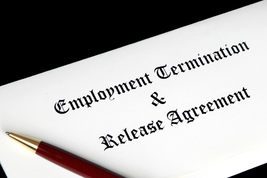Negotiating Severance Agreements

It's common for an employer to offer their employees a severance package upon termination, lay-off or even when an employee resigns. A severance package may include a lump some compensation, extended payroll and/or benefits, company stock, or a combination of some or all of the above items. Employers offer severance for two main reasons (except those situations where they are obligated to pay severance by contract): (1) to maintain a good will in the industry / reward the employee for his work and (lengthy) tenure with the company and (2) to make sure that the employer doesn't have to deal with any type of claims by that employee later - after he leaves the company.
There are no laws that would obligate an employer to pay severance to anyone, regardless of how long they worked for the employer and how good of an employee they have been, except in those cases where there is a specific contract or written policy that states that a separated employee is entitled to a certain amount of severance pay per month or per year worked. Otherwise, it's completely up to the employer whether to offer any severance at all, and how much to offer.
Typically, in order to receive the severance, an employee has to sign a "severance agreement", which will state in so many words that in exchange for the monetary benefit that you receive, you will waive any and all rights to any kind of claims and lawsuits that you might otherwise be able to bring. In other words, the employer gets a peace of mind of knowing that you are not going to sue them in exchange for providing you with the severance package. The fact that your employer offers you severance doesn't mean that you have or don't have a strong claim against the employer, as more often than not a severance offer is just an economic / business decision by the company, and it is not reflective of the merits of your potential case.
Once you sign the severance agreement, you will not be able to sue that employer for anything, unless there is evidence that the severance agreement is invalid, which is rare and requires strong evidence of duress, i.e. a showing that you were actually forced to sign an agreement or you didn't have a meaningful opportunity to review the document before signing it.
Generally, it's a good idea to have an experienced employment attorney review your severance agreement before you sign it for a number of reasons, including the following:
(a) helping you decide whether you are better off signing the severance agreement or, instead, bringing a claim against the employer, by evaluating whether a wrongful termination or discrimination / retaliation case can be made;
(b) whether you should try to negotiate a higher severance based on the facts of your termination or have an attorney negotiate on your behalf;
(c) making sure that the document is drafted properly and fairly without imposing any draconian restrictions on you and your future career.
There are no laws that would obligate an employer to pay severance to anyone, regardless of how long they worked for the employer and how good of an employee they have been, except in those cases where there is a specific contract or written policy that states that a separated employee is entitled to a certain amount of severance pay per month or per year worked. Otherwise, it's completely up to the employer whether to offer any severance at all, and how much to offer.
Typically, in order to receive the severance, an employee has to sign a "severance agreement", which will state in so many words that in exchange for the monetary benefit that you receive, you will waive any and all rights to any kind of claims and lawsuits that you might otherwise be able to bring. In other words, the employer gets a peace of mind of knowing that you are not going to sue them in exchange for providing you with the severance package. The fact that your employer offers you severance doesn't mean that you have or don't have a strong claim against the employer, as more often than not a severance offer is just an economic / business decision by the company, and it is not reflective of the merits of your potential case.
Once you sign the severance agreement, you will not be able to sue that employer for anything, unless there is evidence that the severance agreement is invalid, which is rare and requires strong evidence of duress, i.e. a showing that you were actually forced to sign an agreement or you didn't have a meaningful opportunity to review the document before signing it.
Generally, it's a good idea to have an experienced employment attorney review your severance agreement before you sign it for a number of reasons, including the following:
(a) helping you decide whether you are better off signing the severance agreement or, instead, bringing a claim against the employer, by evaluating whether a wrongful termination or discrimination / retaliation case can be made;
(b) whether you should try to negotiate a higher severance based on the facts of your termination or have an attorney negotiate on your behalf;
(c) making sure that the document is drafted properly and fairly without imposing any draconian restrictions on you and your future career.